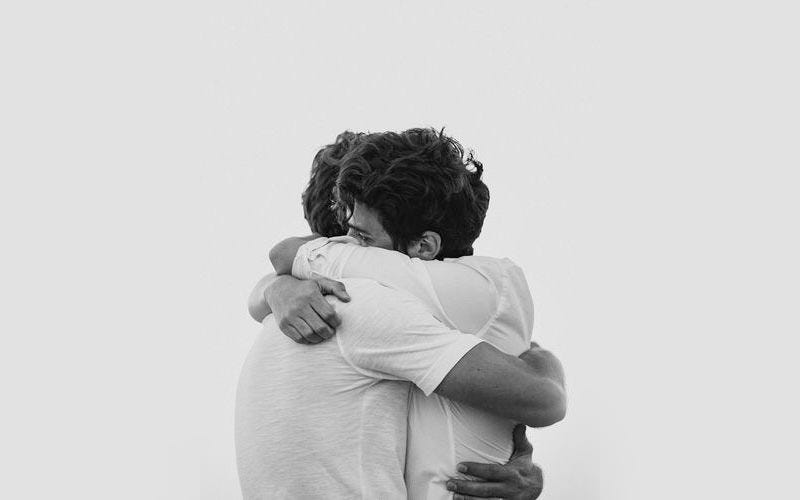Messages from GymTok
POV: You aren’t controlled by your s*xual desires anymore, you focus on skincare and physical appearance, and your mental health is the best it’s ever been.
I crave intamacy but I don’t want temporary people touching my mind, body or soul. Sort of, kinda a big problem with this generation.
Not caring what ppl think and just living life >>>
Behind his IDGAF attitude is a man who allowed a girl to break him while he was trying to save her from her own demons. Now he’s trying to prove he’s worthy enough to be someones first choice.
realizing all i do is work, go to the gym, and hangout with myself

The h*rny thing
On the one hand, there’s the belief that you can transmute sexual energy into physical energy, alleviating your horniness and the problems that go along with it by working out to your limits. On the other hand, there’s the belief that lifting increases your testosterone levels, making you even hornier. This contradiction exposes the utter strangeness of sexuality in lifting culture. Yes, you have the fuckboys and regular people alike lifting to become more attractive and get laid; in the early aughts, a radio ad for a gym near me was a sexy woman purring, “Want to look better… naked?” But today, you also have people who turn to the gym because they are incredibly suspicious of their sexuality and who see the gym as a repudiation of it, of the easy pleasures of “hookup culture,” of the compulsions of porn and jacking off.
Maybe some of this sigma male shit is bad faith—just male tsundere behavior: I don’t want sex; I’m trying to get extremely hot for unrelated reasons. OK, bro.
But maybe lifting can replace sex. Or can try to.
An older lesbian in my life observed a similar phenomenon among middle-aged women in her yoga classes. The point, she said, is to be in and feel satisfaction with your body, but not with other bodies. (Who better to trust about sexlessness than an older lesbian?) When it comes to straight men, I’m more skeptical, simply because I’ve been told on good authority that straight men will go to hysterical lengths on the off-chance that a woman will DM them; I, in contrast, have never degraded myself for sexual attention, at least not pathetically or totally pathetically, so I’m writing at my epistemological limits. But we can at least say that a developing narrative, whether a ploy or not, is that the gym is a means of opting out of the sexual marketplace.
In certain corners of the discourse, you hear it said that the falling rates of sex among young people is, in part, because women who formerly would have sought validation of their desirability through sex now find it by posting selfies for hundreds of likes. The usual counterpart claim is that men jack off to porn instead of going out to meet women. But I’ll raise a more intriguing possibility: men continue to seek validation of their masculinity but less through sex and more through the gym and/or displays of their self-discipline. Especially for younger people, sex is often a matter of mimetic desire for the approval of their same-gender peers more so than a desire for the sexual object (hence the preoccupation with reaching and disclosing one’s sexual milestones and the treatment of girls as means to these ends). Have we simply witnessed a split between sexual desire and mimetic desire? A man can satisfy sexual desires just by jacking off (maybe not maximally or ideally, but at least sufficiently) and can satisfy the mimetic desire to be Like Other Men through other means—namely lifting. As a consequence, sex itself falls in importance.
It’s not an argument I totally buy—dudes wanna fuck, let’s not over-theorize this—but perhaps these two motivations have fallen out of total lockstep. Lifting can replace sex insofar as sex wasn’t really about women but about wanting to become like other men.
Consider just briefly
She isn’t going to mire your obliques, but he will. 😳
Gymcels
The gymcel—i.e., the person who commits himself to the gym instead of a romantic pursuit—is, in some sense, a practical outcome of the grind. It’s hard to make the time commitment of dating when your day-to-day life is filled with optimization and health routines. This economic logic reframes the pursuit of romantic relationships. The ROI of dating is low, or at least lower than self-improvement. As sex detaches from life-structuring goals (e.g., marriage, children), it seems more hollow and pointless. Lifting provides an alternative set of goals, offering a feeling of existential meaning and agency. Control over one’s happiness in a post-love era.
Yet the prospect of love haunts the character of the gymcel. Though less antisocial than his cousin, the gymcel shares with the incel his view of women as a cluster of promises—for love, marriage, children, family, respect. Women, in this view, don’t simply gatekeep sex, as they do in the conventional incel understanding. Rather, they gatekeep a morally righteous way of life. Or perhaps a morally self-righteous way of life.
Unlike incels, who feel like they are entitled to women for no reason (or vague religious reasons), gymcels see themselves as holding up their part of the heterosexual bargain by going to the gym and becoming disciplined and strong—in their eyes, husband material. Andrew Tate encourages boys to become high-value (or high-quality) men capable of securing a high-value woman. This romantic transaction validates their perceived self-valuation. Women are necessary to complete these fantasies and, indeed, complete gymcels as men. Hence in this view, women, particularly through promiscuity, deny men of both their manhood and the achievement of a moral life. A low-value woman—which is most women, in this view—cannot validate a high-value man. The best alternative to prove one’s value is to forgo women.
All of which, I should note, is a lot to scapegoat onto women.
The post-heartbreak revenge plot
Sexual resentment is probably a normal phase that most young people, regardless of their gender, pass through. It isn’t new for the gym to be a proving ground for heartbroken men (see: divorced dads), and twenty-somethings often forswear love after their first major heartbreak before coming around to it again. What often goes unnoticed is that women assume a great deal of risk in entering a relationship with a man and men assume a great deal of risk at the end of a relationship. This is an old Paul Skallas beat. After a breakup, men are more likely to fall into behaviors that lead to personal ruin—depression, suicide, addiction, alcoholism, etc.—or make drastic life changes, “just basically going off the rails,” to use Skallas’s lissome prose. But dissipating in depression is only one outcome. The other is to take revenge.
The post-breakup “revenge” narrative can go in two ways—often but not exclusively gendered—and both of which have a deeply embodied component. The first is the self-care route: Since my breakup, I’ve learned my self-worth, improved my health, and expunged the toxicity from my life. The second is the self-destruction narrative: Since my breakup, I’ve abandoned my need for love, pushed myself to the limits, and become evil. The similarities to the neoliberalism versus libertarianism dynamic from the previous section should be noted, in part because going to the gym supports either narrative. It’s the latter narrative that’s more worrisome. For divorced dads, the gym was a way of reintegrating into the sexual marketplace and maybe taking revenge on a partner by becoming hotter (see: “revenge bod”). For younger men, the latter is still true, but the gym has become a declaration of self-sufficiency: I don’t need love or sex; I have God and the gym.
I wonder whether the revenge narrative isn’t the result of changes to sexual morality. Historical notions of sexual morality placed the primary dividing line on the issue of premarital sex. But today, most people don’t think of premarital sex as particularly immoral (though perhaps casual sex is a bit more of a sticking point). The new dividing line for sexual morality seems drawn over the issue of cheating. I’m not sure whether there are figures on cheating, particularly as the cause of relationship failure, but one assumes that it has become more prevalent given the ease of dating apps for meeting people discreetly. Cheating, as an act of betrayal, narratively prompts the idea of revenge. But it isn’t just revenge at the Other—getting hot to throw it in the face of your cheating ex—but getting revenge against yourself for being made a fool. It becomes a form of self-destruction, beginning with the vulnerability to trust.
The gym yokes together self-sufficiency with punishment, and more importantly, frames them as moral growth. The monk turns into an aspirational figure—a virtuous man of God who doesn’t need a woman and sees that desire as a spiritual shortcoming.
The highest position in a sexual hierarchy is transcendence.
Gym friends
The dominant metaphor for contemporary loneliness—of “being alone together,” to use a phrase from an old TED Talk—is the headphones. We plug up our ears to create a barrier between ourselves and the outside world, and it becomes impolite to chat with someone because you’re necessarily interrupting them. Perhaps it’s just a fantasy, but there’s this belief that women have an easier time approaching other women they don’t know than men do. Among men, urinal etiquette has turned into a social principle across all areas of life.
You see this in action on the gym floor. Thirty guys milling around on their phones with headphones in, not making eye contact. I don’t mean to downplay social atomization, but consider for a minute how bad and loud gym muzak invariably is. My gym plays music by singers that sound like they’re imitating imitations of Drake imitators. Not the sort of music anyone knows, wants to listen to, or can sing along to (and boys love a singalong). It’s basically a form of hostile architecture. The segmenting of a common culture—back when we all listened to the same songs on the same radio stations—has eliminated the potential for music to create a shared space. Better to put on noise-canceling headphones and vibe out alone.
(I do it tbh. Don’t think I’m living in purity.)
Even so, I made a gym friend—or to put it more accurately, someone befriended me. He is fresh out of college, has three-percent body fat, and can outlift me on every lift. He seems to want my validation as a slightly older guy; I want to see him naked. It’s a weird, but workable, dynamic. We don’t have whole conversations and went a long time without even exchanging names. But we look for each other and know we can say hey without feeling like we’re interrupting, and that feels like something.
The thing about me is that I’m not good at having friends. I’m a loner by upbringing and instinct, and I have gone through periods where I haven’t had any—absolutely zero—friends as an adult. Charisma, humor, and decent looks at least spared me the indignity of appearing like a loser. But I have gone through so many periods of speaking to nobody for days at a time—and not a weekend but four, five, six days straight, repeated week after week for months—that they don’t even phase me. Luckily, I don’t feel lonely easily. But what I’m trying to say is that when we talk about “loneliness epidemics,” I’ve been (and probably still am) part of the statistics.
When I read those statistics though, I sometimes wonder what we mean when we talk about friends. I’m reminded of an advice column I read years ago (looking for personal guidance) in which someone asked the columnist how to make friends in your late twenties. “[W]hat I really want is someone to go get Arby’s curly fries at 2 a.m. with,” the advice-seeker said. The columnist sagely responded that this notion of friendship as having curly fries together at 2 a.m. is a fantastical standard for adult friendship—college shit, Hollywood shit, whatever, but not reality. This image of friendship makes me suspect that those think pieces from the early 2010s warning how Facebook was impoverishing our notion of “friendship” accidentally raised the bar unrealistically high for what friendships should entail. The result is that people withhold the title of friend and underreport the people who are effectively their friends, because the latter isn’t eating late-night French fries with them.
This argument doesn’t satisfy me. It’s just cope, and the truth is that life has probably gotten a lot lonelier. I know I still hold out hope for close, personal friendships, ones that bear witness to conversations that unravel past midnight, and my life will always feel lacking in some vital way without them.
Well, life is long, and sometimes, having someone there to keep you from dropping a barbell on your windpipe is all you can reasonably ask for, being so blessed and all.
Lonely White Men
The question of how to fix the loneliness epidemic, such as it may be, is a structural one. The question of how to bear loneliness is an individual one. Or not entirely. Going to the gym is developing into a cultural narrative—the answer to “what you do” if you’re lost, heartbroken, or alone. The narrative isn’t complete yet, but its shape is beginning to take form around the lists of activities you see everywhere in this space: Wake up at seven a.m., go to the gym, take a cold shower, do a skincare routine, listen to a motivational podcast, meditate for ten minutes, etc. A list isn’t a narrative, but it suffices in place of one. Indeed, all these “optimization” behaviors, filling every moment from waking up to going to bed and turned into daily routines, are hysterical hedges against idleness, against contemplation, against loneliness. Against empty time.
I’ve said this before, and I stand by it: I think what marks our moment is a deep fear of self-confrontation. There’s this anxiety that if you even try to confront yourself, you’ll certainly lose. And the thing is, you probably will. Maybe for reasons you’re to blame for, maybe for others you’re not. Besides, even if you confronted yourself, how would things change? They might not. You would still feel lonely. Which is as hard as mortality to bear. What people call “narcissism” may be this existential terror. Far better to count your reps. Stare at your phone for two minutes. Repeat.
How to make friends as a guy in your thirties
Idk, wait until a chad zoomer makes you his bitch.






Hi Daniel,
Is there an email I can reach you at? Outstanding series.